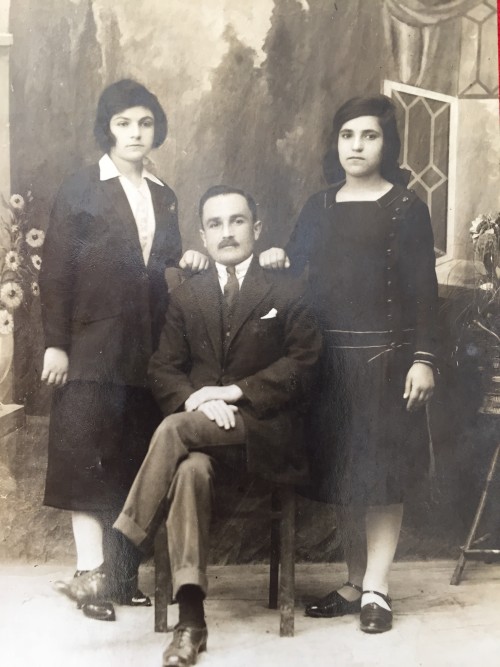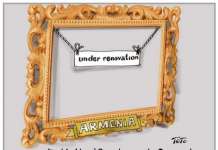HUNDRED YEARS AGO
MY FATHER’S FOUR GENERATIONS
WITH 53 CHILDREN,
GRANDCHILDREN AND GREAT-GRANDCHILDREN
The Revenge of a Survivor
On this centennial year of the Armenian Genocide, my father’s fate as a survivor was no different from anyone else. In the fatal year of 1915, Yeghia Arzoumanian, my father, 18 years old, was forcefully deported from his home in Everek, near Gesaria, with his mother Serpuhi Tersakian Arzoumanian, and two younger sisters Vartuhi and Annitsa. His father, Hagop Arzoumanian, a prominent member of the community and an officer of the City Council all his life, was arrested with his younger son Taniel, and treacherously taken as prisoners in Gesaria, where Taniel died and my grandfather survived, and after the armistice of 1918 returned to Everek to find no one of his family.
My father, Yeghia, his mother, and two sisters began their ordeal on foot, with the help of a donkey which carried the women, sisters on the sides in evenly hanging saddle, and their mother on the back, while my father led them on foot. Through major risks and dangers they arrived successively in Adana, Mersin, Ourfa, and Racca, where their mother, my grandmother Serpuhi, died at age 45. My father, always alert and hard-working young man, was a tailor, even at that tender age he opened temporary tailor’s shop in Adana, and later in Beirut, to provide livelihood for three of them.
After the occupation of Adana by the Kemalist Turks, those exiled, including my father and his sisters, followed the marches and ended up in Aleppo, then in Damascus, and finally in Beirut. It was providential, as my father had mentioned, that their caravan switched the direction to Beirut, while another went to Deir-el-Zor, where all perished. I clearly remember him saying, the three survivors, brother and two sisters, lived in Jell-el-Dib, near Antelias, for quite a while, where my father used his trade, opening a shop in the town. He remembered seeing the orphanage in Antelias, which soon became the site of the Catholicossate of Cilicia in 1930.
The year was 1922. Seven years homeless, and yet alive, faith and hope moved the survivors ahead. My father knew that his uncle, Sarkis Arzoumanian, married with three children, was settled in Cairo, Egypt, migrated from Everek way before the Genocide. With the help of their uncle, the three survivors were able to migrate to Cairo, where my father opened his tailor shop, and the sisters attended the Kaloustian National School until 1927, when they moved to Detroit, Michigan, where their future husbands were expecting to meet them. My father married Serpuhi Nishanian soon after, and were blessed with six children: Makruhi, Hagop, Taniel (Fr. Zaven), Harutiun, Elizabeth, and Maro. My mother’s parents were also originally from Everek, settled in Cairo before the turn of the century.
My grandfather Hagop, after serving three years in the prison, had no reason to stay in Everek, and at age 60 travelled to Cairo, via Jerusalem as a pilgrim, met with the Armenian Patriarch Yeghishe Tourian, offered his gift to the Depository of the Manuscripts, a parchment manuscript text of our church hymns (Dagharan), and arrived in Cairo to reunite with his son and daughters. The Patriarch of Jerusalem had given him a letter of acknowledgement which my father kept, and now it is in my possession. My grandfather was the tall and deeply religious man who led me to church as a child every Sunday. A determined person, he also published a book in 1935, “History of Everek,” which later served as a primary source for future historians. He passed away in 1944 at age 80.
If my father survived the Genocide, an intelligent and hard working man, he also took revenge with my blessed mother Diramyre Serpuhi, offering an unusually extended family to our church and nation, and only his branch of the family today counts 6 children, 17 grandchildren, and 28 great-grandchildren, with both parents honorably seated on the throne. This is a remarkable number indeed of 53 members shining to tell the criminals “Here we are standing honorably and observing the canonization of our holy martyrs.” In addition, the two survived Arzoumanian sisters multiplied the number, offering 4 children each, many grandchildren and great-grandchildren, all of them scattered in this blessed country of the United States.
Honor and glory are due to God Almighty, and no less to the survived man Yeghia and his devoted wife Diramyre Serpuhi, my parents. In 1966 both of them were able to come and live the rest of their lives with their children in the United States and Canada. As for my father, he had his great dream come true, to travel to Michigan after 40 years separation and meet his sisters and their families. This is not a mere history. IT IS AN EPIC!
On this centennial Armenians stand tall forever, proud and safe. The enemy is defeated, because its purpose was defeated once and for all. The survivors did miraculous achievements, rising alive from the ashes, and building their immediate future honorably. Turkey, in its inferiority complex is feeling hard the slapping on the face by the nations of the world. Archives were recently opened in the Vatican, and memorial liturgy is on its way at St. Peter’s Cathedral by His Holiness the Pope of Rome. The Mother See of Holy Etchmiadzin is ready to canonize our martyrs of the Genocide as Saints of the Armenian Church. All added together can only prove the determination of the survivors. Armenian cathedrals and churches were built by hundreds, and our nation is standing proud to celebrate nationally the defeat of the murderers and the victory of the survivors.
Fr. Zaven Arzoumanian, PhD












